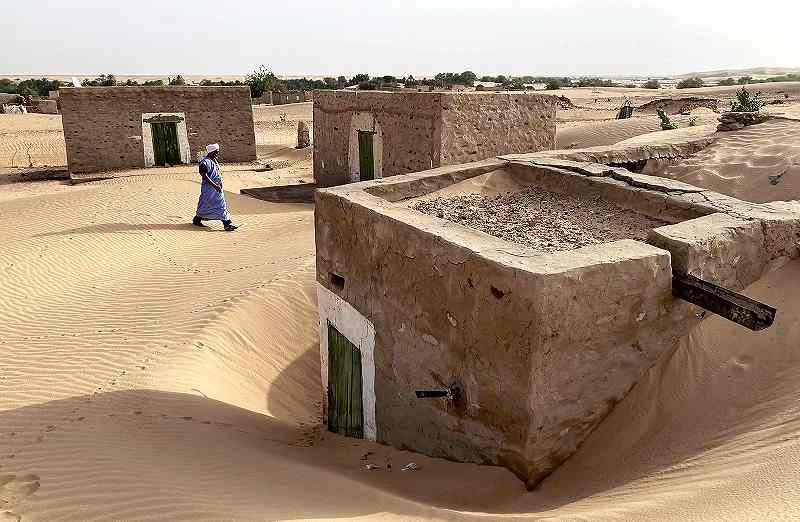World heritage engulfed by Sahara Desert sand in global warming

A house is half buried in sand as the desert continues to expand in Chinguetti, Mauritania, on July 31.
1:00 JST, August 28, 2022
The Japan-led Eighth Tokyo International Conference on African Development (TICAD8), is being held in Tunisia to discuss Africa’s development challenges, one of its main themes. The two-day conference started Saturday. There is a high expectation for Japan, which has decarbonization and other technologies, to play a role in avoiding a worst-case scenario in Africa.
CHINGUETTI, Mauritania — Having survived as a trading center for more than 1,000 years, this ancient city registered as a World Heritage site is being steadily engulfed by the Sahara Desert.
“The city may soon disappear,” said Salem Youma, 49, who was mending the wall of his house on the outskirts of the old city. Beside him, a young relative was shoveling away a sand pile more than 2 meters high.
Chinguetti, including the surrounding areas, is home to about 5,000 people these days, having lost more than half of its population in about 10 years. The expansion of the desert is the prime factor for its population loss.
There had been no rain here for 11 years until June this year.
Measures such as planting date palms and other means have not been successful in halting the desertification. Residents have been abandoning their homes and leaving the city one after another.
The Sahara Desert in northern Africa has expanded by 10% in the last 100 years.
Besides the over-cutting of trees, climate change is considered one of the factors contributing to the expansion of the desert.
The sand gains momentum year after year, also in Chinguetti.
“It is my birthplace, so I want to continue living here. But I wonder if I can win the battle against the sand,” Youma said anxiously.
Great Green Wall
On the outskirts of Rosso in southern Mauritania, saplings of trees that are resistant to drought and can grow in sandy soil are being planted over an area of 10 hectares.
“The sandy soil was coming closer and closer to our village. I hope more trees will be planted so that we will be able to feel safe soon,” said farmer Bekaye Mohamad, 45.
Eleven countries, including Mauritania, began a project in 2007 to build a Great Green Wall of trees stretching about 8,000 kilometers as part of efforts to stop the expansion of the Sahara. The project aims to restore vegetation to an area of 100 million hectares by 2030.
Carbon dioxide emissions in Africa account for only about 4% of the global total. Yet the effects of droughts and floods are enormous, with Asia, Europe and the United States passing the burden on to Africa.
More than 216 million people could be forced to move within their countries by 2050 due to climate change, according to a 2021 report by the World Bank. Given that Africa accounts for almost half of the total at 105 million people, there is concern that this could increase the number of refugees and trigger new conflicts.
Abnormal weather has also caused widespread damage. Although there is no known cause-and-effect relationship with climate change, record flooding has occurred in South Sudan, and Angola is in a severe drought, with more than 1.5 million people facing a food crisis.
Progress on the Great Green Wall project, which is considered to be one of the main measures, has only reached about 20%, due to financial difficulties and inadequate management.
Mauritania needs more support from the international community, said Alioin Fall, coordinator in charge of climate change at Mauritania’s Environment Ministry.
Rising sea levels
A threat is also coming from the sea.
Egypt, which will host the U.N. Climate Change Conference (COP27) in November, is striving hard to combat erosion that is becoming stronger every year.
According to Egypt’s Water Resources and Irrigation Ministry, the sea level rose by an average of 1.8 millimeters per year in the early 1990s on the Mediterranean side, but in the past decade it has risen by 3.2 millimeters per year.
It is predicted that an area of about 2,660 square kilometers, slightly larger than Kanagawa Prefecture, will be inundated in 2100, causing damage to 5.7 million people.
In northern Egypt’s Alexandria, there have been reports of stores along the seafront being inundated, and the construction of barriers is underway in areas such as around the Qaitbay Fort, a famous tourist attraction.
Abbas Sharaqqy, a professor at Cairo University and an expert on climate change issues, said it is important that the world’s major powers take the lead in reducing the use of fossil fuels more and stopping global warming.



